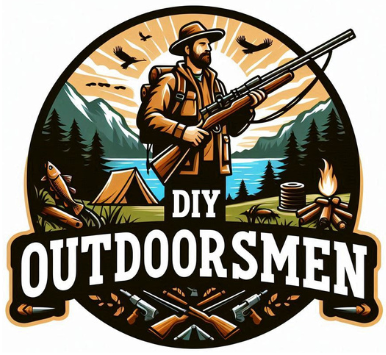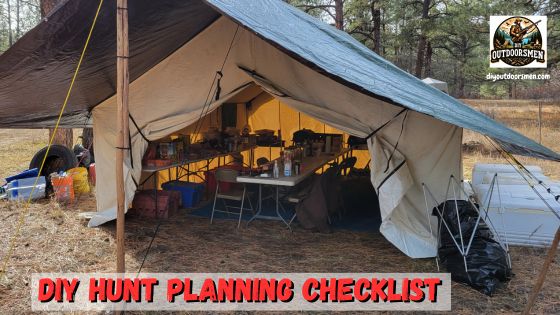Contents
Heading out on your first hunting trip can be thrilling and a bit overwhelming. A well-organized hunting checklist makes a world of difference, ensuring you’ve got everything you need for a successful outing. The importance of being prepared can’t be overstated, especially when safety and success are on the line. Let’s break down why a hunting checklist is so crucial for beginners.
KEY POINTS:
Being prepared significantly increases your success and safety in the field. Hunting isn’t just about your skill with a rifle or a bow; it’s about having the right equipment and knowing how to use it. The proper gear can keep you warm, dry, and comfortable, which is vital when spending long hours outdoors. Without a detailed hunting checklist, it’s easy to forget something essential, such as your ammunition or even your hunting license, which can derail your trip before it even begins.
Next, let’s talk about avoiding common beginner mistakes. It’s easy to overlook vital gear or end up overpacking when you’re new to hunting. A checklist helps streamline your gear selection, ensuring you bring only what’s necessary. This means you’re not lugging around extra weight, which can wear you out quickly, especially if you’re hiking through rough terrain.
Finally, staying organized for your first hunt is key to reducing stress. When you have a comprehensive hunting checklist to follow, you’ll feel more confident and assured that you haven’t missed anything critical.
This peace of mind allows you to focus on the experience rather than worrying about what you might have forgotten. The role of a checklist in reducing stress and ensuring a smooth hunting experience can’t be underestimated.
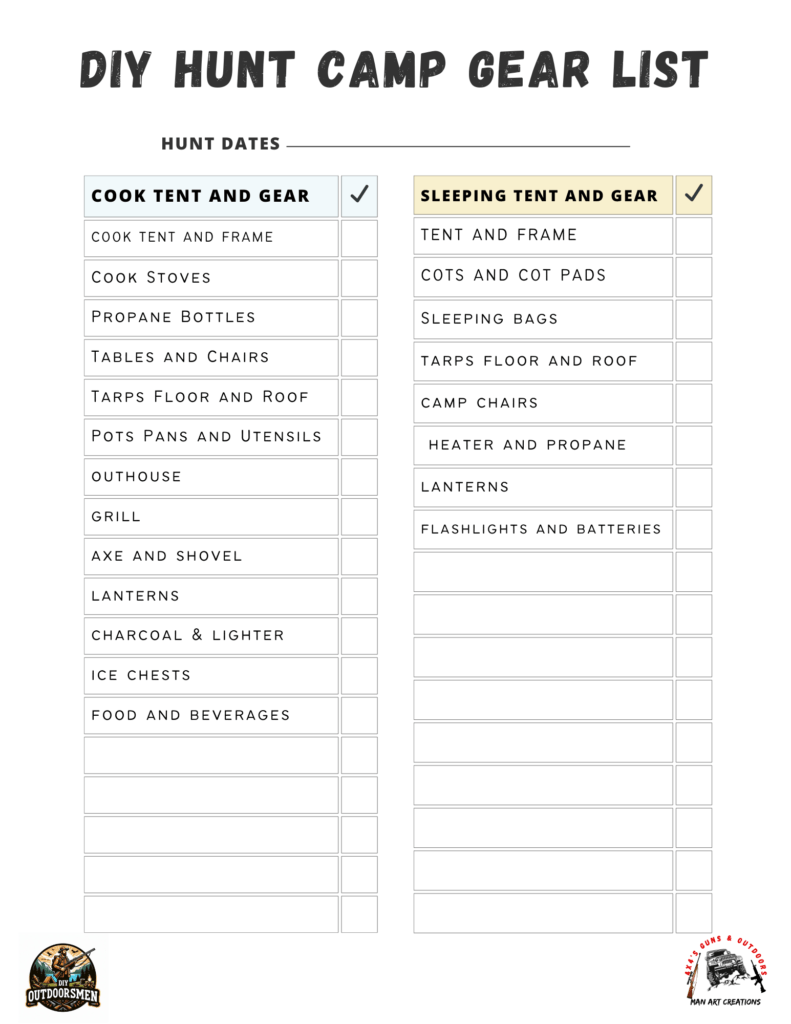
Essential Hunting Gear Checklist
When you’re planning for your first DIY hunting trip, and building your hunting checklist, having the right gear can make a significant difference in your comfort and success. Let’s break down the key categories of hunting essentials that every beginner should consider.
Clothing and Apparel
The right clothing keeps you comfortable and protected in the field. Camouflage or hunter orange gear is vital. Camo helps you blend into your environment, while blaze orange ensures other hunters can see you, which is critical for safety. Depending on your hunting location, choose the appropriate camo pattern, whether it’s for woodlands, open fields, or snow-covered areas.
Weather-appropriate clothing is another must. Layering is key: start with base layers to manage moisture, add insulating layers for warmth, and finish with waterproof and windproof outer layers to shield you from harsh weather.
Don’t forget sturdy, waterproof boots tailored for the terrain, whether mountains, forests, or fields. You’ll also need thermal socks, hunting gloves, and a good hat to protect against the elements.
Weapons and Ammunition
Selecting the right weapon is crucial. For firearms, consider a beginner-friendly hunting rifle that suits the type of game you’ll be hunting. If you prefer archery, a bow that’s easy to handle and accurate is a great choice.
Make sure you have the correct caliber ammunition or properly matched arrows for your weapon and the game you’re targeting. Maintaining your weapon in the field is vital, too. Carry a cleaning kit and basic maintenance tools, like spare parts, to ensure your firearm or bow remains in top condition.
Optics and Sighting Tools
Optics can be a game-changer in the field. Good binoculars are essential for scouting game from a distance. Look for ones that are durable and have clear optics. Also, a rangefinder is invaluable for accuracy, helping you judge distances accurately and making your shots more precise.
If you’re using a rifle or bow, a quality scope or sight that’s properly calibrated can make a big difference in your shooting accuracy. Spend some time getting familiar with these tools before your hunt.
Personal Safety and First Aid
Safety should always be a priority. A well-stocked first aid kit is indispensable and should be included in your hunting checklist. Include basic items like bandages, antiseptic, gauze, pain relievers, and splints. Be prepared for common injuries like cuts, sprains, or other minor injuries you might encounter in the wilderness.
Emergency supplies like a firestarter kit, whistle, and space blanket can be lifesavers. Always make sure you have the proper licenses and permits for the game you’re hunting and the location.
This not only keeps you legal but also ensures you’re adhering to local regulations, which promotes ethical hunting practices. Having the right gear on hand can transform your hunting experience, making it safer, more comfortable, and ultimately more successful.
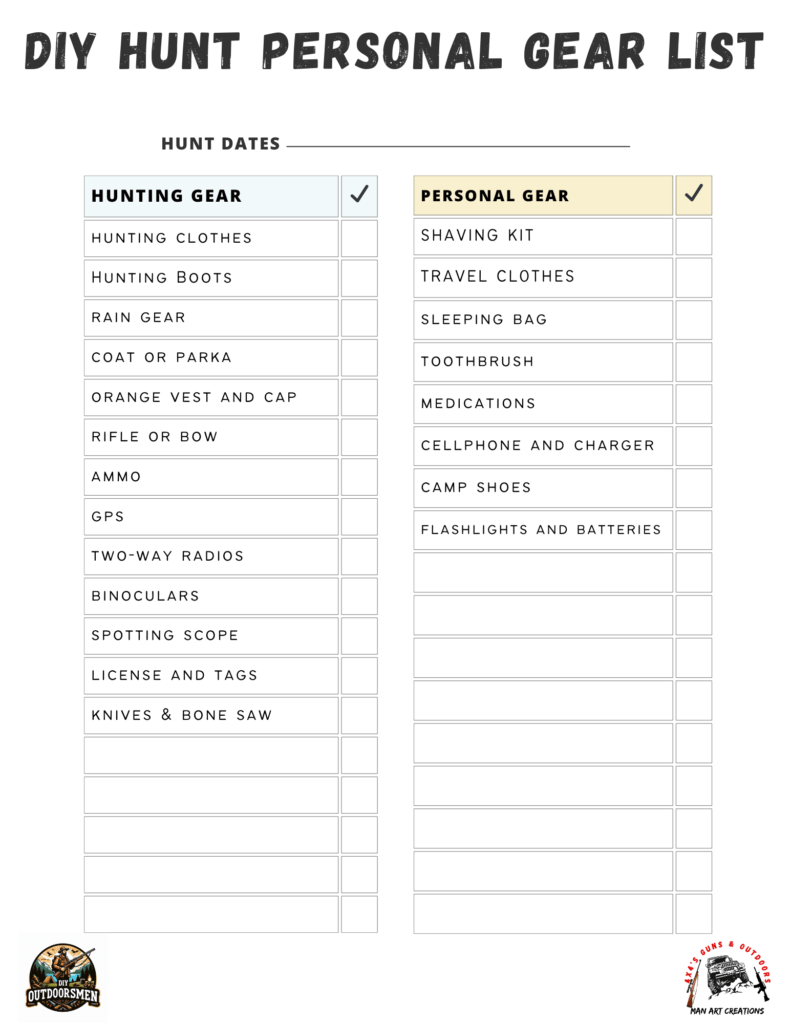
Hunting Checklist – Accessories and Equipment
Having the right field accessories can greatly enhance your hunting experience, making it more efficient and enjoyable. Let’s explore the essential items to add to your gear list.
First up, choosing the right backpack or hunting pack is crucial. The pack should be comfortable, sturdy, and have enough storage for all your essentials, whether you’re on a day hunt or an extended trip.
Look for packs with padded straps and multiple compartments to keep your gear organized. Don’t forget to pack extra layers, food, water, and essential tools like maps, GPS, and a headlamp.
Next, game calls and lures can increase your chances of drawing animals close. There are various types of game calls suited for different animals such as deer, elk, turkey, and ducks. If you’re new to using game calls, start with beginner-friendly options that are easy to master.
Scent control products and attractants like deer urine can also improve your odds by masking your scent and luring game to your area.
A field dressing kit is another must-have item. A sharp, high-quality hunting knife is essential for field-dressing your game. Consider additional tools like a bone saw, gut hook, and game bags.
Latex gloves are important for maintaining hygiene during the process, and having antiseptic wipes or spray on hand ensures you can clean your tools and hands afterward. By incorporating these field accessories into your hunting checklist, you can enhance your efficiency and effectiveness in the field, leading to a more rewarding hunting experience.
Knowing where you are and staying in touch with your hunting party is crucial for a safe and successful hunt. Let’s tackle the navigation and communication tools that every beginner should have in their arsenal.
First, even if you plan on using a GPS device or hunting app, always carry a map and compass as a backup. Technology can fail, batteries can die, and having a map and compass ensures you won’t get lost. Make sure you’re comfortable with reading topographic maps and using a compass before you head out.
A reliable GPS device or a hunting app can be invaluable. These tools can help you track your location, mark key spots like your campsite or areas where you’ve spotted game, and even plan your route. Many hunting apps offer features specific to tracking game patterns and weather conditions, which can be quite useful.
Having a way to communicate is just as important as knowing where you are. Two-way radios are great for keeping in touch with your hunting buddies, especially if you’re covering a large area. Ensure your radio has a good range and is fully charged before setting out.
In more remote areas where cell service might be spotty, a satellite phone can be a lifeline, allowing you to call for help in emergencies. Investing in these navigation and communication tools can significantly enhance your safety and overall experience in the field, giving you the confidence to focus on the hunt.
Food, Water, and Hydration
Keeping your energy levels up is vital for a successful hunting trip. High-energy snacks can provide the necessary fuel to keep you going. As part of your hunting checklist and hunt preparation, be sure to pack items like protein bars, nuts, jerky, and trail mix.
These snacks are lightweight, easy to carry, and can be eaten on the go, providing a quick energy boost when you need it. Staying hydrated is equally important. Carrying enough water can sometimes be challenging, especially on longer hunts.
Consider using hydration systems like bladders that fit into your backpack, allowing you to sip water easily throughout the day. Additionally, pack portable water filters or purification tablets. This way, you can safely drink from natural water sources if you run out of your supply.
Having a compact stove or a portable cooking system can also be beneficial, especially on multi-day hunting trips. Being able to prepare a hot meal can make a big difference in maintaining your energy and morale.
Freeze-dried meals are a great option—they are lightweight and can be easily prepared with hot water. Planning your food and hydration strategy in advance ensures you stay fueled and hydrated, keeping you at your best throughout your hunt.
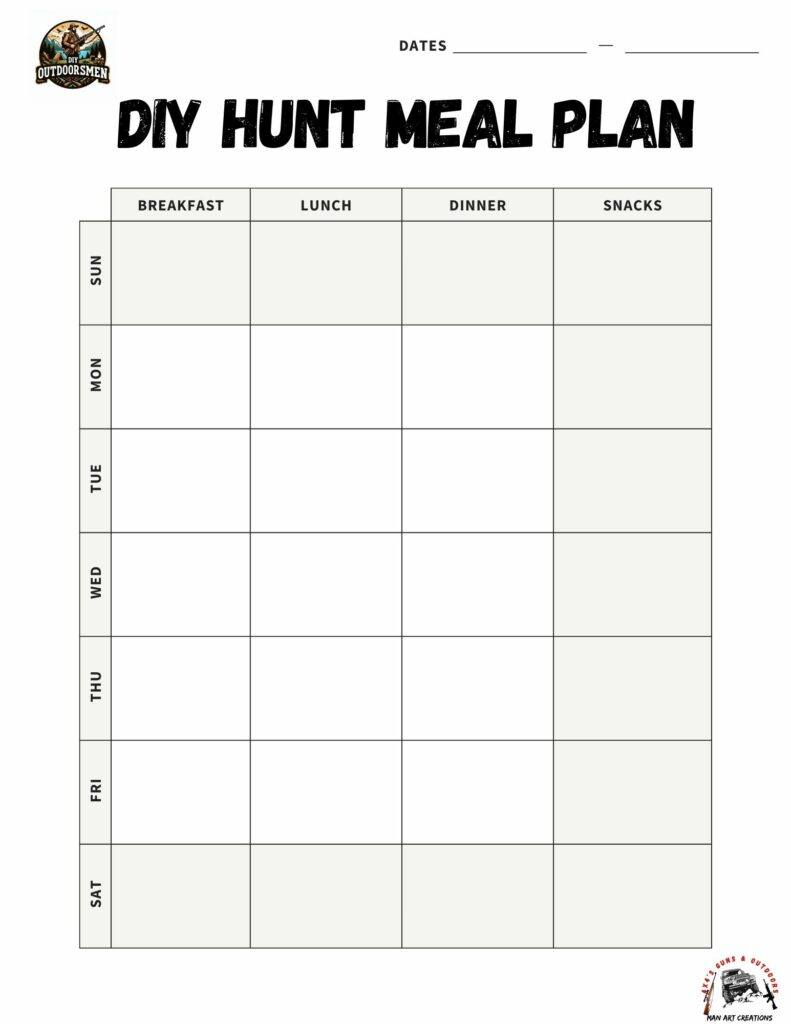
Final Pre-Hunt Preparations
Getting everything ready before you set out is the last piece of the puzzle for a successful hunting trip. Scouting your hunting area in advance is essential. Spend some time researching the landscape, game trails, watering holes, and potential hideouts.
Knowing where the game is likely to be present will give you a significant advantage. Checking the weather conditions before you leave is another crucial step. Weather can change rapidly, and being prepared for whatever nature throws at you can make or break your hunting experience.
Monitoring weather patterns helps you decide on the appropriate clothing and gear to bring. Double-checking your checklist is the final step. Go through your gear, and ensure you have your essentials like your hunting license, weapons, ammunition, and safety equipment.
It’s easy to overlook something in your excitement, so a final review of your hunting checklist can prevent any last-minute surprises. These final preparations help ensure that you start your hunting trip as smoothly as possible, giving you the confidence to focus on the hunt.
Tips for a Successful First DIY Hunt
Patience is a virtue in hunting. As a beginner, it’s important to manage your expectations. It’s not always about immediate success; it’s about learning and improving each time you go out. Enjoy the beauty of nature and the entire experience, even if you don’t bag game on your first few trips.
- Practice makes perfect. Spend time before your hunt practicing with your weapon. Whether it’s target shooting with your rifle or practicing your bow skills, becoming comfortable and accurate with your equipment is crucial. This preparation pays off when you have a game in your sights.
- Safety can’t be overstated. Always let someone know your plans and where you’ll be hunting. Familiarize yourself with the area and be mindful of your surroundings at all times. Adhere to hunting safety practices, including wearing appropriate clothing and using your equipment responsibly.
- Stay adaptable. Weather conditions can change, animals might not appear as expected, and unforeseen challenges can arise. Being flexible and ready to adapt your strategy is key. Sometimes, Plan B can lead to success when Plan A does not.
- Learn from each experience. Every hunt offers lessons, whether you’re successful or not. Take the time to reflect on what worked, what didn’t, and how you can improve. Then make changes to your hunting checklist as needed. This mindset helps you grow as a hunter and increases your chances of future success.
Reflect and Plan for Future Hunts
After each hunting trip, take some time to reflect on the experience. Think about what went well and what could have been improved. This reflection helps you grow as a hunter and prepares you better for future outings.
Review your gear and note any equipment that needs repair or replacement. Did your clothing keep you comfortable? Were your optics clear and reliable? Making these assessments right after your hunt ensures you’re ready for the next one and avoids last-minute issues.
Connect with fellow hunters and share experiences. Listening to and discussing techniques, gear preferences, and hunting areas with others can provide new insights and tips you may not have considered. Engaging with the hunting community helps expand your knowledge and can lead to new friendships and hunting partners.
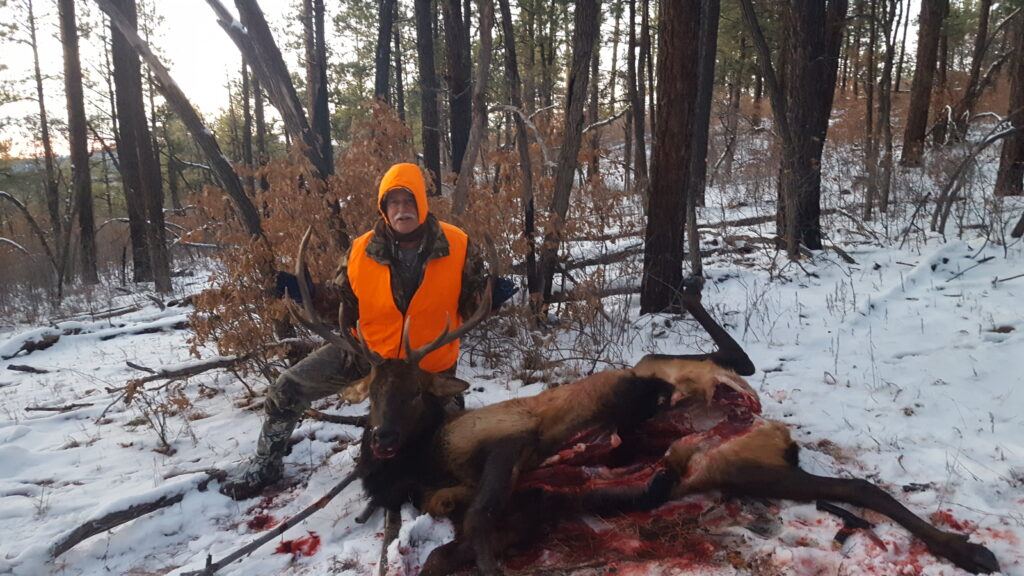
Stay updated on hunting regulations and any changes in your area. Compliance with local laws not only keeps you legal but also promotes ethical hunting practices. Subscribe to newsletters or follow local wildlife agencies to stay informed.
Planning your next hunt begins with setting new goals and modifying your hunting checklist. Whether it’s targeting a different type of game, exploring a new hunting area, or improving specific skills, having clear objectives keeps your hunting experiences exciting and fulfilling. Use your reflections and new knowledge to make each trip better than the last.
As always, stay safe, enjoy the journey and please try to leave it cleaner than you found it. If you have any comments, questions, ideas, or suggestions please leave them in the comment section below and I’ll get back to you ASAP.
Also, if you would like copies of any of the checklists included here, just drop a comment with your email address below and I will send them to you. You can follow us on YouTube: Man Art Creations for videos of our DIY Adventures.
P.S. – Thanks so much for checking out our blog we really appreciate it. Just so you know, we may receive a commission if you click on some of the links that appear on our site. This helps us keep our content free and up-to-date for everyone. We appreciate your support!
